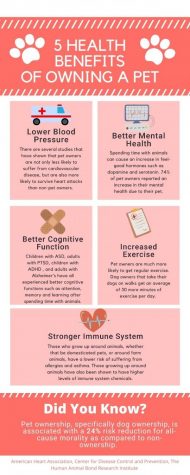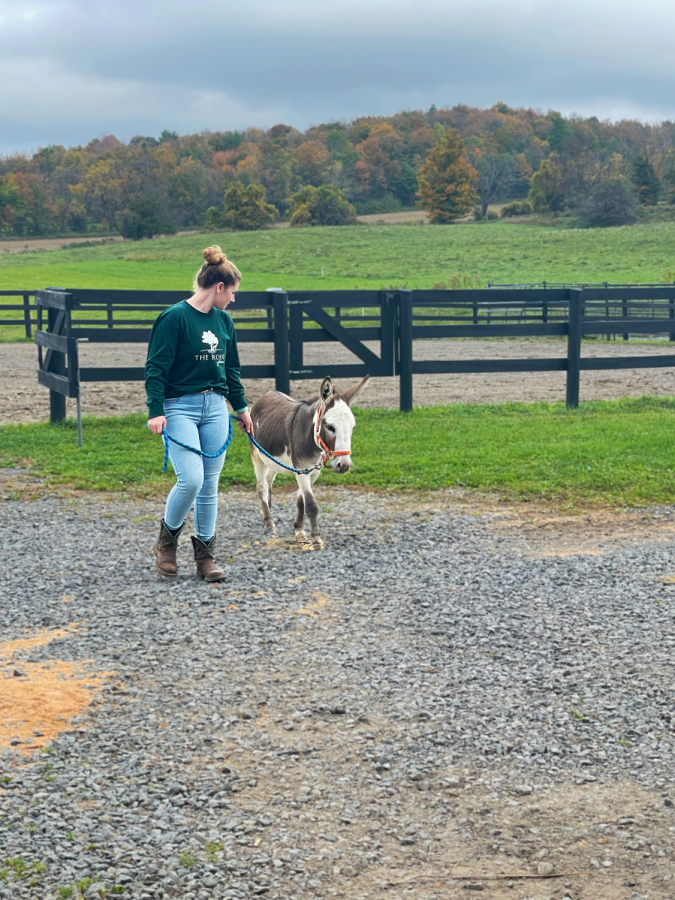Cause for Paws: Healthy animal welfare in the Mohawk Valley takes compassion and many helping hands
A volunteer at The Root Farm in Sauquoit walks with a donkey on the property.
December 16, 2021
Pets are some of the most loved members in American homes and yet are often the most overlooked. Since the beginning of the COVID-19 pandemic, many Americans now realize how vital a pet can be for their mental health.
Most people consider their pets to be a part of their family. In fact, The American Veterinary Medical Association found that 85% of dog-owners and 76% of cat-owners consider this to be the case. People find companionship in animals, whether they are in their homes, on a farm or interacting in everyday life.
Animals do more than provide company, however. They promote a great amount of healing and several mental and physical benefits, according to the Center for Disease Control and Prevention. Spending time with animals can have several positive effects such as increased serotonin and dopamine levels, lessened risk of anxiety and lessened sense of loneliness.
Owning a pet can also have a number of benefits to a person’s physical health. CDC studies revealed that pet-owners are more likely to be physically active, which puts them at a lower risk of disease and/or illness. Their ability to increase positive moods in humans leads to many physical benefits as well, as the link between mental and physical health has proven to be significant.
Utica College senior Kurstan Martin has seen some of these mental benefits herself, after adopting her dog, Max, about a year and half into the COVID-19 pandemic. Martin thought about getting a dog for a while and when she finally went to a shelter – interested in a different dog – Max ran up to her.
“He always knows when I’m anxious or sad,” Martin said. “He’s definitely helped me a lot. Sometimes he will just know when I’m not feeling well.”
Even though animals provide numerous health benefits, the Humane Society of the United States estimates that more than one million animals are abused or killed each year. This does not include the substantial amount of other animal welfare issues such as neglect, abandonment and overall irresponsible pet ownership.
The Cause for Paws project examines animal welfare in the Mohawk Valley to help raise awareness about issues surrounding the animals and their owners. Students studying multimedia journalism at Utica College will spotlight different topics through stories, videos and podcasts in a five-week campaign.
A means of healing
Interaction with animals can significantly improve one’s mental and physical health, according to the American Heart Association. An AHA study showed that dog ownership was associated with a 24% risk reduction for all-cause mortality as compared to non-ownership. These results are due to health benefits shown in dog-owners such as lower blood pressure, lower stress levels and even improved heart health.

The benefits of spending time with animals has encouraged the creation of different organizations across the country to give these benefits to those in need. One of these organizations is Pet Partners, which has a registered team located in Central New York. The Pet Partners staff has undergone training so they can provide animal therapy to those in need. The team interacts with a wide variety of populations, including veterans, students and senior citizens. Volunteers often visit schools, nursing homes, hospitals and other locations so pets can make a positive difference.
Mary Gilbert, president of Pet Partners of Central New York, said they have seen a number of benefits for those who have interacted with the therapy animals.
“We have worked with nursing professionals doing research that showed lower blood pressure, lower pain perception and elevated mood after a hospital visit,” Gilbert said. “Children who read to animals gain confidence and improve their reading skills.”
COVID-19’s impact
Like many other organizations, the COVID-19 pandemic has greatly affected many shelters’ abilities to stay open, leading many around the nation to experience serious funding shortages. On top of the lack of funds, many shelters are housing even more animals than usual, making the job increasingly more difficult.
Another issue impacting many places is a lack of staff, or even the lack of funds to employ the proper level of staff. The Root Farm in Sauquoit has faced similar challenges since the start of the pandemic. They were forced to take major cuts on staffing, relying on just a few full-time faculty and the help of volunteers.
Rodger Pape, director of The Root Farm, said a silver lining is that the downtime has given the staff the opportunity to reevaluate their programs to make them even better. These programs consist of equine assisted therapy, team bonding activities, agricultural production and more.
What concerned The Root Farm staff the most was the animals. Pape said “keeping the animals safe, happy, healthy and exercised” was the priority. Having done so, they have also been able to add on to the Root Farm family, including adopting two calves who will be involved in their upcoming calf cuddling events. These events will give people the opportunity to let go of the everyday stress of living through a pandemic, and just sit with an adorable calf and experience the healing powers that animals undoubtedly have.
According to the American Society for the Prevention of Cruelty to Animals, one in five households acquired a pet since the beginning of the pandemic. The reason for this can be attributed to the human need for comfort in such a stressful time. And this need has certainly been and continues to be fulfilled for many Americans throughout the pandemic as pets are continuing to be adopted.
Responsible pet ownership is key
The commitment required of pet owners is overlooked, which can cause an increase of pet abandonment or surrender. According to the American Society for the Prevention of Cruelty to Animals, a quarter of pets in shelters had been abandoned by their owners.
The responsibility can be overwhelming, and information may seem hard to come by to some people. Marsala Bono, a local veterinary technician, said some of the main responsibilities to keep in mind when taking in a pet are being able to provide exercise for their pet daily, giving them the love and attention they need, saving money for when a pet becomes sick so they can receive appropriate care and keeping pets up to date on vaccines and preventative care.
As both an animal care professional and a pet owner, Bono said being able to watch pets grow up and see their personalities evolve is one of her greatest joys.
“We are forming bonds with every patient that comes in,” Bono said. “And when times get tough for that animal, it becomes just as hard to say goodbye to them as if it were our own pet.”
What a pet needs, however, usually changes depending on the animal, and even the breed. Some dog breeds just require more attention, including special diets or increased exercise, and it is important to keep this in mind when taking in a pet.
Veterinary professions are in the field because they love animals and are there to help. In recent years, and now heightened due to COVID-19, there is a shortage of veterinary professionals. Bono chose that field because of her love for animals and the ability to “help animals because they don’t always have a voice to tell us what is wrong.”
Giving back
There are several different ways people can help animals in the Greater Utica area, although it may be difficult to know where to start. The Mohawk Valley is home to many animal shelters and sanctuaries that help pets find a good home and provide a temporary one for them in the meantime, including the Humane Society of Rome, Spring Farm CARES in Clinton and Anita’s Stevens Swan Humane Society in Utica.
Some of these local organizations offer adoption services where others, such as Spring Farm CARES, provide a place for a variety of animals to enjoy the remainder of their lives and give visitors the opportunity to interact with these animals.
However, in order to survive these organizations need help from the community.
There are numerous ways to help out those who promote animal welfare. Most shelters accept more than monetary donations and encourage items such as food, blankets, toys and other necessities.
Volunteering is another crucial element in helping shelters stay afloat. This can range from helping directly at the shelter to assisting with planning events. Either way, the shelter is being helped and ultimately so will the animals living there.
“Volunteering at local shelters is always a great thing to do,” said Bono. “They are always looking for people to dog walk or play with the animals.”




































































































































